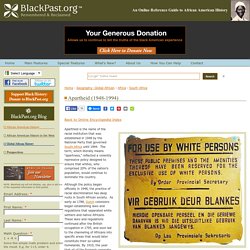

Archive - Apartheid in South Africa - Living under racial segregation and discrimination. Apartheid (1948-1994) Apartheid Sign, ca. 1980 Image Ownership: Public Domain Apartheid is the name of the racial institution that was established in 1948 by the National Party that governed South Africa until 1994.

The term, which literally means “apartness,” reflected a violently repressive policy designed to ensure that whites, who comprised 20% of the nation's population, would continue to dominate the country. Although the policy began officially in 1948, the practice of racial discrimination has deep roots in South African society.
As early as 1788, Dutch colonizers began establishing laws and regulations that separated white settlers and native Africans. By 1948, Dr. Soon afterwards the new government instituted a number of policies in the name of apartheid which sought to “ensure the survival of the white race” and to keep the different races separate on every level of society and in every facet of life. The Group Areas Act of 1950, however, was the core of apartheid in South Africa. Definition of Apartheid by Merriam-Webster. Definition, Facts, Beginning, & End. Businessinsider. JOHANNESBURG (AP) — My mother was furious.

The operators of the gas station in rural, racist South Africa had taken her money to fill the car, but would not give her the key to the toilets. They were for whites only. It was the early 1960s, and apartheid was the law of the land. So my indomitable mum did the only thing she could do: She ordered me and my two sisters to urinate right there, very publicly, in front of the fuel pumps. We did not disobey, but I started crying — and my sisters bawled, too. My widowed mother, Ethel Pillay, had driven us from our home in Zimbabwe, which was then called Rhodesia, to visit family in her native South Africa. There was racism in Rhodesia, too, but it was nothing like the institutionalized code in South Africa that made blacks subhuman — the system that Nelson Mandela later fought to bring down.
We had been on the road for more than 15 hours that day. The car trip presented its own challenges. Sometimes those lines got blurred. The History of Apartheid in South Africa. South Africa (see map) is a country blessed with an abundance of natural resources including fertile farmlands and unique mineral resources.

South African mines are world leaders in the production of diamonds and gold as well as strategic metals such as platinum. The climate is mild, reportedly resembling the San Francisco bay area weather more than anywhere in the world. South Africa was colonized by the English and Dutch in the seventeenth century. English domination of the Dutch descendents (known as Boers or Afrikaners) resulted in the Dutch establishing the new colonies of Orange Free State and Transvaal. The discovery of diamonds in these lands around 1900 resulted in an English invasion which sparked the Boer War. With the enactment of apartheid laws in 1948, racial discrimination was institutionalized.
In 1951, the Bantu Authorities Act established a basis for ethnic government in African reserves, known as ``homelands.'' Where to go from here: Next. Apartheid - Facts & Summary. In 1976, when thousands of black children in Soweto, a black township outside Johannesburg, demonstrated against the Afrikaans language requirement for black African students, the police opened fire with tear gas and bullets.

The protests and government crackdowns that followed, combined with a national economic recession, drew more international attention to South Africa and shattered all illusions that apartheid had brought peace or prosperity to the nation. The United Nations General Assembly had denounced apartheid in 1973, and in 1976 the UN Security Council voted to impose a mandatory embargo on the sale of arms to South Africa. In 1985, the United Kingdom and United States imposed economic sanctions on the country. Under pressure from the international community, the National Party government of Pieter Botha sought to institute some reforms, including abolition of the pass laws and the ban on interracial sex and marriage. YouTube. Imperialism: Crash Course World History #35. Nonviolence and Peace Movements: Crash Course World History 228.